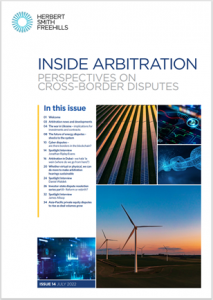Welcome to issue 14 of Inside Arbitration.
We are delighted to share with you the latest interactive issue of this publication from Herbert Smith Freehills' Global Arbitration Practice.
Despite signs of post-Covid recovery, the invasion of Ukraine has had global ramifications, exacerbating the already challenging cost-of-living crisis, with soaring inflation as energy, food and consumer product prices have spiked. Many of our corporate clients have been faced with closing their Ukrainian operations and supporting staff through enormously challenging circumstances. As trusted advisors to our clients, we need to be able to anticipate and respond to the challenges and opportunities on the horizon as political and financial instability have knock-on effects across regions and sectors.
Incorporating articles, interviews and videos from our practitioners around the network, this edition features articles and interview spotlights from across our global team in addition to recent arbitration news and developments including:
- The war in Ukraine – implications for investments and contracts: Andrew Cannon, Hannah Ambrose, Olga Dementyeva and Jake Saville-Tucker explore some of the principal considerations in relation to terminating Russia-related commercial contracts and how investment treaties may offer an avenue for recourse if investments in Ukraine or Russia are affected by Russian state action.
- The future of energy disputes: shocks to the system: Craig Tevendale, Louise Barber and Divyanshu Agrawal discuss how battered supply chains and turbulent geopolitics mean the energy sector should brace for a surge in disputes
- Cyber disputes – are there borders in the blockchain? With the cyber economy fast emerging, courts are struggling with drawing borders in a decentralised world. Simon Chapman QC and Troy Song highlight one recent case that hints at the path ahead
- Arbitration in Dubai: wa hala' la wein (where do we go from here?): Following a busy year, Stuart Paterson, Nick Oury and Patrick O'Grady reflect on how the consolidation of two leading Dubai arbitration centres has radically changed the UAE disputes landscape
- Whether virtual or physical, we can do more to make arbitration hearings sustainable: Amal Bouchenaki, Craig Tevendale, Maguelonne de Brugiere and Olga Dementyeva present the findings of our study comparing the carbon impact and expense of virtual hearings with in-person equivalents.
- Investor-state dispute resolution series part II: Reform or rebirth?: With concerns from stakeholders growing, Andrew Cannon and Vanessa Naish consider how ongoing reforms could rebalance the ISDS process.
- Asia-Pacific private equity disputes to rise as deal volumes grow: Following a period of pandemic-enforced turbulence, private equity deals have rebounded strongly, with disputes likely to grow as a result. Chad Catterwell and Guillermo Garcia-Perrote consider the implications of recent developments for disputes in this sector.
- Spotlight interviews: Our three new arbitration partners Jonathan Ripley-Evans, Dan Waldek and James Allsop feature in our Spotlight articles, shedding light on their specialisms in their regions (and their story so far)
Previous issues can also be viewed here. We hope that you enjoy reading issue #14 of Inside Arbitration and would welcome any feedback you may have.
Key contacts
Disclaimer
The articles published on this website, current at the dates of publication set out above, are for reference purposes only. They do not constitute legal advice and should not be relied upon as such. Specific legal advice about your specific circumstances should always be sought separately before taking any action.






